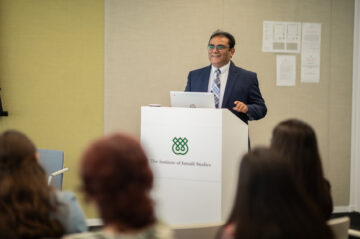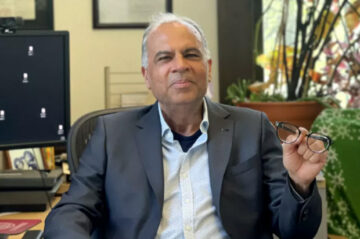The Fatimids and their Traditions of Learning by Heinz Halm offers a comprehensive account of Fatimid intellectual life. Translated from German in 1997, it is the second monograph in the Institute’s Ismaili Heritage Series and explores the culture and patronage of teaching and learning in the Fatimid capital of Cairo, whose prosperity and fame attracted scholars, scientists, poets and artists from all over the Muslim world. Bringing together widely-scattered primary source materials, The Fatimids and their Traditions of Learning provides a lucid account of the North African dynasty and their varied contributions to Islamic culture and civilisation.
Make a Shield From Wisdom by Annemarie Schimmel, first published in 1993, brings the poetry and thinking of Nasir Khusraw (1004-ca.1073) to a wide audience, including translations of some of his qasidas. Through descriptions of the world around him, Nasir Khusraw paints a vivid picture of his life and world and provides insight into the historical period in which he lived. By placing his poetry in the context of his contemporaries, Sufis and more recent poets such as Muhammad Iqbal (1877-1938), the reader benefits from the depth and breadth of Annemarie Schimmel’s knowledge of Persian poetry and Islamic spirituality, while gaining a rich understanding of Nasir Khusraw’s poetic style.
As Islam spread beyond the Arabian Peninsula into the neighbouring regions of Syria, Iraq, Iran, Egypt and beyond to North Africa and Central Asia, it became enriched by the intellectual contributions of a multitude of individuals, communities and cultures, in regions that eventually comprised the Muslim world. Within three centuries, the Islamic world became characterised by a diversity of literary and intellectual traditions in various fields of learning, while Islam as a religion became elaborated in a plurality of expressions and interpretations.To generate discussion on the nature and significance of these developments, the IIS organised a seminar at the University of Cambridge in August 1994.
Intellectual Traditions in Islam, edited by Farhad Daftary, makes available key papers presented at the seminar, exploring the pivotal role of the intellect in the legal, theological, philosophical and mystical traditions of Islam and its continuing relevance in the efforts of contemporary Muslims to address the challenges of modernity.
Mediaeval Isma‘ili History and Thought, also edited by Farhad Daftary, is the 1st collected volume of its kind in Islamic Studies. Bringing together a wide range of original material reflecting a diversity of disciplines and methodologies, the chapters in the book cover selected themes and developments related to the pre-Fatimid, Fatimid and Nizari phases of Ismaili history, and deal with a wide variety of topics. These range from the earliest cosmological doctrine of the IsmailisAdherents of a branch of Shi’i Islam that considers Ismail, the eldest son of the Shi’i Imam Jaʿfar al-Ṣādiq (d. 765), as his successor., to the development of jurisprudence under the FatimidsMajor Muslim dynasty of Ismaili caliphs in North Africa (from 909) and later in Egypt (973–1171) More, to the origins of the Nizari Ismaili movement and the ginanic literature of the Ismaili Khojas of the Indian subcontinent.






